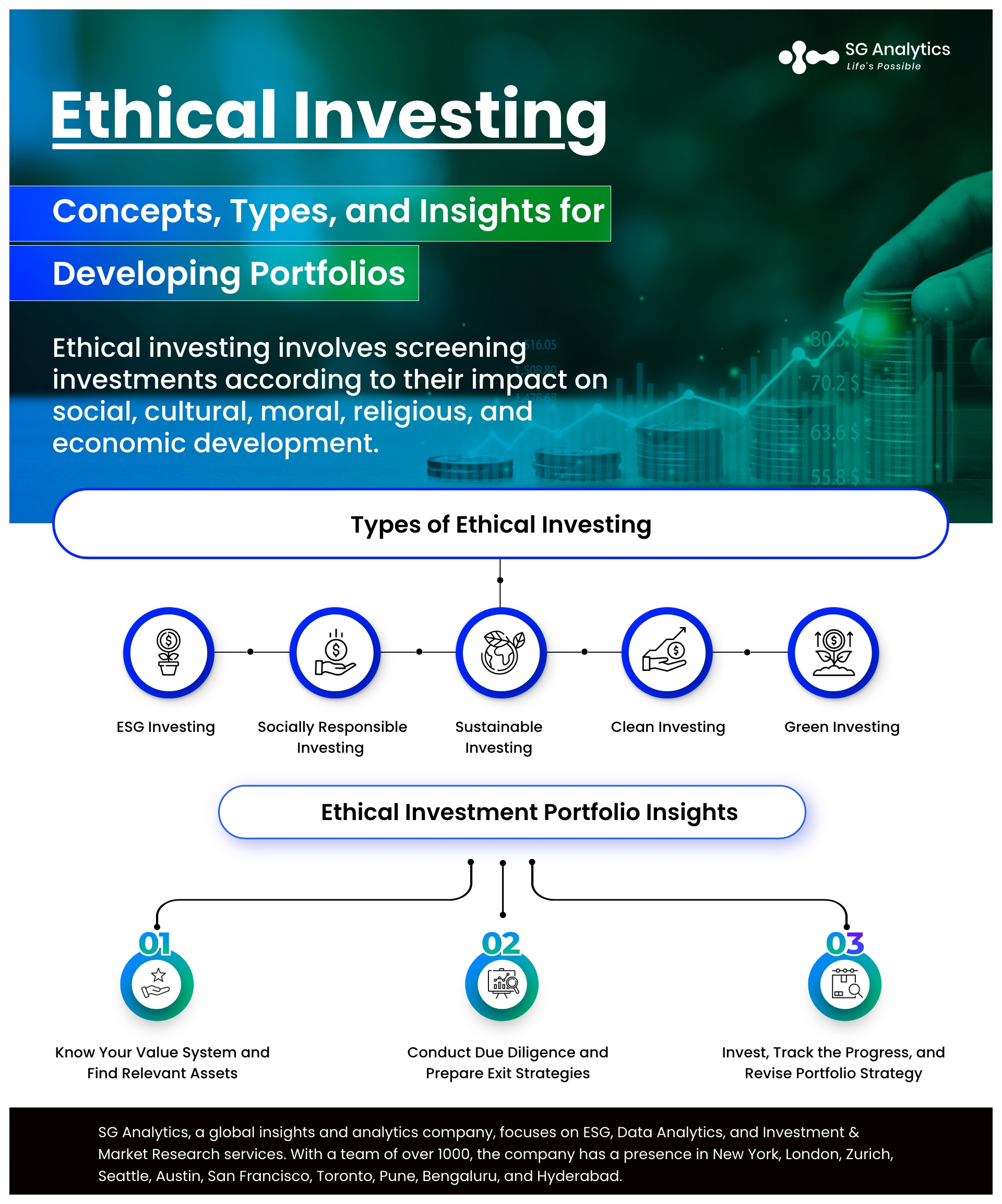Addressing the global economy’s challenges, environmental crises, and social issues is necessary amid the rising stakeholder demand for more ethical organizations. This situation has encouraged businesses worldwide to redefine their production, delivery, and relations management strategies.
More investors seek ethical investments in multiple industries. Besides, technological innovations have streamlined what a corporation must do to embrace sustainable business models. This article will elaborate on what ethical investing portfolios encompass and their approaches.
What is Ethical Investing? Knowing the Concept
Ethical investing involves screening investments according to their impact on social, cultural, moral, religious, and economic development so that investors can focus on businesses doing good for the world. For instance, investors might avoid investing in an alcohol and tobacco company but prefer a startup with renewable energy adoption as its mission statement.
Similarly, stakeholder activism, extensive awareness, increased literacy rate, and environmental problems threatening civilization have pushed brands to embrace sustainable development goals (SDGs). Therefore, market talks have prioritized integrating methods to examine each enterprise and “green” fund from an ethical perspective.
Socially and ethically responsible investing attitudes are on the rise. This trend encompasses all publicly-held organizations, private companies, high-net-worth individuals (HNWIs), and regional governments. So, these entities invest in advanced technologies to implement holistic environmental, social, and governance (ESG) policies.
Also Read: ESG Reporting Frameworks: Explained

Understanding the Importance of Ethical Investing
1| Ethical Investment Holds All Stakeholders Responsible
Investing in a business that manufactures potentially habit-forming consumables or releases a significant volume of pollutants into Earth’s biosphere implies investors contribute to the current world problems. Simultaneously, companies can delay their green tech adoption or ignore stakeholder interests if there is no financial materiality risk with SDG or ESG non-compliance.
2| Innovative Ideas and Positive Workplace Culture
The pressure forces all corporations worldwide to innovate how they conduct their business operations. Moreover, investors can facilitate more extensive research and development (R&D) concerning less pollutive production and transportation methods. This approach embraces a solid brainstorming culture in ethical corporate workplaces.
3| Increasing Coordination Between the Scholars and Businesses
For instance, for a long time, academic research and industrial progress exhibited slow dissemination of knowledge. Manufacturers and service providers wanted financially feasible systems to solve their business challenges. Meanwhile, scientists and universities have emphasized analytical clarity. The gap between the scholarly literature and corporate interests has shrunk due to the shift toward ethical investments and green technology marvels.
Types of Ethical Investing
1| ESG Investing
ESG investing will rely on statistical compliance assessment, benchmarks, and sustainability reporting to distinguish responsible and non-compliant organizations. So, a company lacking commitment to SDGs and similar principles will get a low rating. Similarly, when expanding their portfolio, investors will select brands and projects with healthy ESG scores.
The ESG metrics can encompass biodiversity preservation, socioeconomic inclusivity, and financial transparency. However, corporations must evaluate their legal exposure to country-specific ESG or sustainability disclosure norms.

2| Socially Responsible Investing
When investors prioritize the “social good” concerning a company’s compliance initiatives, products, and services, this approach is socially responsible investing. How does the target enterprise facilitate employment, women empowerment, and workplace safety? Or, how will its products impact society in the long term? These queries guide this investing strategy.
Read Also: ESG and Impact Investing: The Future of Responsible Finance
3| Sustainable Investing
Earth’s resources will not last forever. Therefore, businesses, consumers, investors, and governments want to reduce resource consumption. Investor attitudes will screen stocks according to their role in building a future where the next generations can live harmoniously with nature, leading the sustainable investing movement.
4| Clean Investing
Clean investing dedicates all due diligence activities to developing an ethical investment portfolio entirely focused on pollution regulation, greenhouse gas (GHG) reduction, and renewable energy. Besides, it taps into data available on sector-specific environmental liabilities. It can also extend to responsible waste management and recycling, though the main focus area is cleaner energy resource consumption.
5| Green Investing
Green investing prioritizes screening stocks, exchange-traded funds (ETFs), and funds that leverage sustainability accounting metrics to mitigate industrial pollution and biodiversity decline risks. For instance, green investors can select ethical investment funds that align with GHG emissions regulations, like the EU taxonomy. They can also seek enterprises with effective social responsibility initiatives (SRIs).
Who is Inclined Toward Ethical Investing?
1| Investors Driven by Social Values
Cooperative society members are more likely to rationalize their capital resource allocation based on how they can help the society as a single entity. Moreover, this approach might evolve according to a member’s needs, including family-related emergencies.
A housing society’s financial planning will focus on maintenance, renovation, parking, utilities, and recreational zones. Meanwhile, an agricultural cooperative institution will evaluate methods to improve irrigation systems across multiple cultivated fields.
Investors sharing identical value systems will optimize their strategies to “give back to the society.” Therefore, the sense of belonging to and benefitting from a community will inspire them to engage in ethical investing due to the “greater good” mindset.
Read Also: Sustainable Fashion: Top Ethical Fashion Trends to Know in 2023
2| Investors Focused on Morality
If alcohol-based consumables, weapon manufacturing, tobacco, adult entertainment, and meat-based food threaten humanity as well as Earth’s biosphere, is investing in related businesses moral? High-net-worth individuals (HNWIs) and specific fund managers avoid those industries across every ethical investing portfolio.
Moral investing uses a social adverse impact lens in the due diligence, company profiling, and buy-sell decisions. So, philanthropists are more likely to opt for moral investing.
3| Religious and Culturally-Conscious Investors
Every faith has its unique concepts describing virtues and vices. As a result, followers of different religions will use those principles to distinguish respectable organizations from the “sinful” ones. Simultaneously, investors concerned about the regional languages’ extinction, protecting the historical places, or the traditional handicraft industry’s preservation will support the firms in taking the necessary measures.
Religious and culturally responsible investors can develop an ethical investing portfolio to embrace and promote the values acceptable to their faith’s core guidance. Whether empowering orphanages or helping rehabilitation centers expand their capacity, a sense of fulfilling a virtuous duty directs the religious investors.
4| Environmentally-Responsible Investors
Pollution affects health, an unhealthy workforce reduces productivity, and the resulting inefficiencies hurt investors, governments, employees, and consumers’ interests. Therefore, all industrial outcomes, like pollution, that endanger the harmonious coexistence with nature have financial materiality risks.
Environmentally responsible investors can get inspiration from ethical investing strategies to streamline asset valuation and risk calculation, combating greenwashing efforts.
Related: Connecting the Dots: Sustainability 2.0 & Green-Line Growth
5| Political Activism Enthusiasts
Consider the following questions:
- Does poverty cause crime? Or do criminal acts make and keep people poor?
- Will providing food, clothing, shelter, and medicine free of cost empower financially weak individuals? How can donors track and prevent potential misuse of the related schemes?
- Who will pay for the affirmative action initiatives? How will taxpayers react to tax hikes that increase the government’s affirmative action scope?
- Will the dominating foreign companies erase, acquire, or help local enterprises?
- Does artificial intelligence reduce or increase employment opportunities?
Individuals will have a lot of positive and negative opinions on these queries. However, they are more likely to invest confidently if the political leadership shares their values regarding these socioeconomic concerns.
Several investors conduct thorough background research on policymakers in a country. They also investigate the political inclinations of regional leaders, including corporate executives’ public interactions.
A politically-driven ethical investing portfolio can focus on supporting a left-leaning or right-leaning leadership. Since ethics vary drastically across the political spectrum, the liberals and the conservatives will have unique but contradictory approaches toward stock screening.

How to Develop a Portfolio for Ethical Investing?
Creating an ethical investing portfolio involves the following steps.
Step 1 – Know Your Value System and Find Relevant Assets
Do you want to encourage research and development (R&D) into solar panels, accessibility technology, or consumer privacy protection? An investor must recognize the top priorities aligning with beliefs. Otherwise, unsatisfying outcomes will affect confidence in ethical investing.
Step 2 – Conduct Due Diligence and Prepare Exit Strategies
Investors can employ controversy analytics, ESG criteria, social listening, and investment research solutions to choose portfolio companies. They must also prepare adequate exit strategies if a brand fails to back its “green claims” through on-ground work.
Step 3 – Invest, Track the Progress, and Revise Portfolio Strategy
Maintaining an ethical investment portfolio demands investors actively inspect how the social responsibility initiatives or renewable energy research has achieved envisioned milestones. ESG and SDG risks vary throughout a company’s lifecycle. So, ethical investors must divest from corporations that lose their ESG ratings.
How Do Ethical Investment Portfolios Work?
Ethical investing enthusiasts utilize the following strategies that govern portfolio development.
1| Inclusionary Strategy for Positive-Impact Investments
Ethical investors can compare companies and ETFs using ESG benchmarks, controversy research, and financial disclosures. When they find suitable projects to invest in, they can use multivariate predictive analytics services to assess their impact.
If the positive impact assessment satisfies their requirements, they will conduct financial materiality risk analysis. After all, an ethical investor must adhere to discipline and data-driven decisions. Otherwise, they will support an enterprise that lacks efficient resource utilization. So, finding the positively impacting stocks and other assets in an ethical investment portfolio still relies on responsible financial attitudes.
2| Exclusionary Strategy for Negative-Impact Assets
Some ethical investors will invest in all industries and exclude brands with a documented history of engaging in socially harmful activities. Therefore, they have an exclusionary approach toward developing an ethical investment portfolio.
Investors can ignore tobacco manufacturers and funds having potentially problematic brands. This ethical investing strategy can also examine a company’s reputation. For instance, investors will refrain from supporting firms known for questionable human resource management (HRM) practices.
3| Prioritizing Environmental Considerations
Reducing water consumption and replacing non-renewable energy resources with renewable ones are the environmental aspects of an ethical investor’s screening strategy. Besides, the investors will use carbon emissions disclosure reports, third-party ESG rating databases, and sustainable accounting frameworks to gauge the environmental cost of a brand’s industrial activities.
4| Social Justice Focus
Inclusive workplaces that preserve all employees’ dignity recognize their rights, protect them from workplace hazards, and make provisions for their retirement are attractive to ethical investors. That is the social justice focus, embracing the much-needed corporate participation in scaling affirmative action policies.
What is affirmative action? It attempts to re-balance the opportunities and access to professional development irrespective of an employee’s personal background. A form of multi-generational socioeconomic “correction,” affirmative action addresses social discrimination and systemic marginalization issues. It is often at the core of an exceptional ethical investment portfolio.
5| Governance as the Top Priority
Investors can empower cybersecurity watchdogs, research labs, and chartered accounting firms to help increase corporate governance. Doing so allows ethical investors to protect their community’s data from cyber criminals while curbing business intelligence leaks or corruption.
Governance-led investments assist legal advisory firms, universities, independent ethical hackers, and financial analysts. After all, several governance and transparency problems result from a lack of adequate legal and fintech consultation that recognizes the obstacles of global business expansion.
A company’s policies might be legal in one country yet unacceptable in another. Similar inconsistencies also affect comparative benchmarks, further diluting the data quality necessary for ethical investing. So, investors selecting this strategy will dedicate their resources to brands enhancing governance across IT, finance, and law.
Related: Why Organizations Need to Leverage Data Governance on Dark Data
6| ESG-Based Consolidated Approach
Ethical investors wanting an SDG-compliant investment portfolio can reduce the due diligence and data acquisition troubles using a consolidated strategy. This strategy must inspect a company’s profile for environmental, social, and governance risks. Additionally, it will empower all the stakeholders through ease of implementation and progress tracking.
ESG, an investing approach gaining momentum in multiple markets, allows for the required consolidation. Today, many ESG data services offer businesses, investors, and governments extensive aid in risk calculations and SDG compliance.
These solutions integrate cloud platforms, data visualization, and self-service modules, facilitating flexibility. As a result, ethical investment portfolio development becomes streamlined. Moreover, ESG consultants can automate data gathering, framework research, and periodic reporting using artificial intelligence (AI) and machine learning (ML).

Benefits of Ethical Investing
- An ethical investment portfolio enables investors to support social and economic growth.
- It also discourages businesses from engaging in morally, culturally, and environmentally problematic activities.
- Ethical investing helps investors integrate their value system with their portfolio management strategies.
- Beyond the financial returns, ethics-driven investments enhance living standards, inclusion, environmental preservation, and corporate integrity.
- The fruits of ethical investing keep improving the lives of many generations.
- Simultaneously, investors, businesses, and regulatory bodies contribute to sustainable development goals thanks to an ethical investment portfolio.
Challenges of Ethical Investing
- Investors following religious, moral, philosophical, or environmental values must estimate their decisions’ political implications in each demographic. Otherwise, cultural and political controversies will adversely impact their returns.
- Place, people, history, and socioeconomic situation will affect the stakeholder’s perception of what can be ethical or unethical. Therefore, a lack of a universally standardized approach for creating ethical investment portfolios and reporting discourages some investors. It also exacerbates confusion among business leaders.
- Finally, specific projects can seem ethical at first. However, professional investment researchers or ESG analysts might find suspicious reports during due diligence. Investors must employ the right tools to combat these challenges, like greenwashing risks.
Is Ethical Investing Effective?
Whether ethical investing will offer an impressive return on investment (ROI) depends on the investor’s strategy, market dynamics, and data quality. So, the standard due diligence requirements are vital. However, the exclusionary approach will reduce the maximum investment opportunities for diversification.
The judgment to balance ethical needs with financial performance will vary among investors, researchers, and advisors. Therefore, investors must select experienced data vendors and financial consultants.
Investors Can Stop Ethical Investing, but Should They Do So?
Some ethical ETFs and identical assets charge higher fees than what conventional investment vehicles would require. And they can exhibit an ROI lower than other assets. Although it can make ethical investing less attractive to some, investors willing to accept this possibility for their personal value systems still engage in this approach.
If maximizing ROI is your priority, you can develop a two-pronged strategy to replace specific ethical investments with more rewarding assets. Nevertheless, inspect each asset’s risk-reward potential through qualitative research.

Conclusion
Ethical investing has pros and cons, but the ongoing global crises highlight the need for this approach. It enables investors to make portfolio decisions relevant to their worldviews. Therefore, religious groups, cooperative societies, HNWI philanthropists, political funds, and environmentally conscious investors seek ethical investment opportunities to diversify each portfolio.
Still, standardization and greenwashing are remarkable challenges in ethical investing, necessitating ESG criteria, SDGs frameworks, consolidated benchmarking, and controversy analytics. So, investors must strategically overcome them to maximize returns and the social good, collaborating with reputable investment research providers.
SG Analytics, recognized by the Financial Times as one of APAC's fastest-growing firms, is a prominent insights and analytics company specializing in data-centric research and contextual analytics. Operating globally across the US, UK, Poland, Switzerland, and India, we expertly guide data from inception to transform it into invaluable insights using our knowledge-driven ecosystem, results-focused solutions, and advanced technology platform. Our distinguished clientele, including Fortune 500 giants, attests to our mastery of harnessing data with purpose, merging content and context to overcome business challenges. With our Brand Promise of "Life's Possible," we consistently deliver enduring value, ensuring the utmost client delight.
A leader in ESG Services, SG Analytics offers bespoke sustainability consulting services and research support for informed decision-making. Contact us today if you are in search of an efficient ESG (Environmental, Social, and Governance) integration and management solution provider to boost your sustainable performance.
About SG Analytics
SG Analytics is an industry-leading global insights and analytics firm providing data-centric research and contextual analytics services to its clients, including Fortune 500 companies, across BFSI, Technology, Media and entertainment, and Healthcare sectors. Established in 2007, SG Analytics is a Great Place to Work® (GPTW) certified company and has a team of over 1100 employees and a presence across the U.S.A., the U.K., Switzerland, Canada, and India.
Apart from being recognized by reputed firms such as Analytics India Magazine, Everest Group, and ISG, SG Analytics has been recently awarded as the top ESG consultancy of the year 2022 and Idea Awards 2023 by Entrepreneur India in the “Best Use of Data” category.
Frequently Asked Questions (FAQs) - Ethical Investing
Q1. What is the Difference Between Ethical Investing and Traditional Investing?
Traditional investors pledge their capital to established and time-tested asset classes with attractive ROI. Meanwhile, an ethical investment portfolio augments stock screening, asset valuation, and risk calculation through ESG metrics, religious principles, social justice concerns, and political values.
Q2. Can Ethical Investments Really Generate Competitive Financial Returns?
Yes. An ethical investor can get an impressive ROI depending on data quality and company profiling strategy. Also, ethical businesses are often more resilient to market fluctuations as they work toward sustainable business development. Still, investors’ risk appetite will influence the selected asset’s financial returns.
Q3. Are There Any Risks Associated with Ethical Investing?
All market-related decisions attract risk. Likewise, ethical investing involves overcoming greenwashing and data quality risks during the research phase. Later, the investor will encounter an increase or decrease in the risks throughout a company’s business development.
For instance, a brand can experience a decline in its ESG score due to a supplier’s greenwashing attempt. Ethical investors must monitor these events, including macroeconomic threats, to safeguard their resources.
Q4. What Are Some Challenges I Might Face When Building an Ethical Investment Portfolio?
An ethical investment portfolio will undoubtedly reduce diversification opportunities. After all, several established organizations with better ROI belong to potentially problematic industries. This case includes the top tech companies having weapon development projects.
Therefore, you want to ensure you prioritize your value system to leverage this approach and help tackle ethical, political, religious, social, or environmental problems. Otherwise, be ready to compromise on some principles and allocate some capital to traditional businesses. This dilemma is one of the significant challenges in ethical and impact investing.
Q5. What Are Some Examples of Successful Impact Investing Projects?
Example 1: Patagonia, a recognized brand in the apparel industry, has the Tin Shed Ventures fund. It invests in startups like TERSUS Solution that make washing and managing clothes more eco-friendly.
Example 2: Investing with Impact, a platform by Morgan Stanley, empowers investors to visualize ESG metrics and financial forecasts.
Example 3: “CNote” assists women-led businesses and marginalized communities by helping investors develop an ethical investment portfolio.
Example 4: Citizenergy, a marketplace for sustainable development projects, allows EU investors to support brands sharing their value system for a greener, cleaner, and meaningful future.









